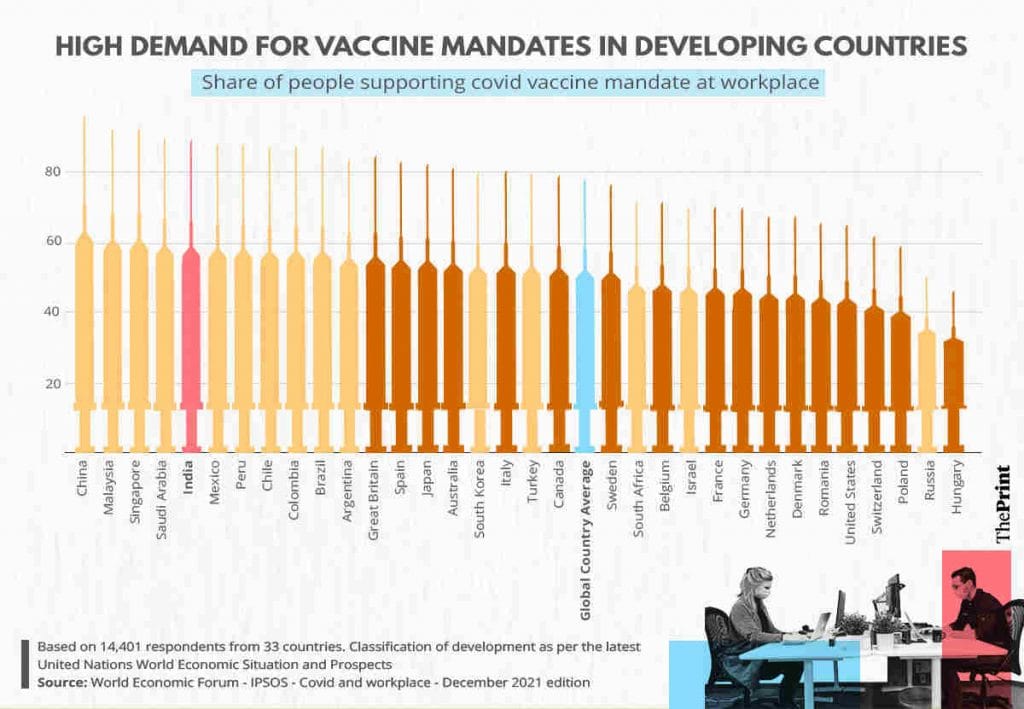New Delhi: Many companies are encouraging workers to return to office, but the majority of employees first want strict Covid safety measures to be enforced at the workplace, a World Economic Forum (WEF) survey, conducted by the market research agency Ipsos, has found.
“Most workers across the world support vaccine and mask mandates and would feel uncomfortable going to work if these protections were not put in place,” said the report released Thursday.
The survey of over 14,000 respondents across 33 countries was conducted between 22 October and 5 November this year, shortly before the emergence of the Omicron variant.
India ranked among the top 10 countries in favour of both vaccine and mask mandates, as well as frequent testing of unvaccinated workers.
The study surveyed 500 respondents from India, specifying that the sample of some countries, including India, tended to be “more urban, educated, and/or affluent than the general population”.
Also Read:39% Indians paid bribe for Covid treatment at hospital during 2nd wave, survey finds
Vaccines in high favour
More than 90 per cent of respondents in India wanted mandates requiring workers to be fully vaccinated against Covid, which had claimed at least 4.74 lakh lives in the country as of Friday.

The global average of workers in favour of vaccine mandates is 78 per cent, with developing countries (according to the UN classification) dominating the top 10.
On the parameter of supporting a vaccine mandate, India ranks fifth among the surveyed countries, preceded by China (97 per cent), Singapore (93 per cent), Malaysia (93 per cent), and Saudi Arabia (91 cent). The respondents least in favour of vaccine mandates were from Hungary (42 per cent), Russia (52 per cent), Poland (59 per cent), Switzerland (62 per cent), and the US (65 per cent).
Masks and testing important too
As many as 74 per cent of respondents worldwide said employees should be tested frequently if they were not vaccinated. India once again scored higher than the global average, with 84 per cent of respondents in favour of frequent testing. The desire for testing was the highest in Malaysia (91 per cent).
The survey report said more people would rather be vaccinated than frequently tested. “If workers were required to get vaccinated or undergo frequent testing to keep their job, about six times as many would choose to get vaccinated over getting tested frequently (68 per cent vs 12 per cent, on average globally),” the report said.
Mask mandates, too, received high approval. Globally, on average, 81 per cent of the respondents believed that there should be a mask mandate in areas where people are in close proximity to each other. In India, this was 93 per cent, the sixth highest among the countries surveyed.
Rebels in the minority
Only 9 per cent of the total respondents said they would try to seek a way around vaccine or testing requirements, but still try to keep their jobs. Another 5 per cent said they would quit their job or find a new one rather than comply with vaccination or testing rules.
Unsurprisingly, in countries where fewer people approve of vaccine mandates, resistance is also high. In the US, Romania, and Hungary, where approval for vaccine mandates is the lowest, the share of people willing to quit their jobs over following the mandate was double the global average of 5 per cent, the report said.
The share of people who said they’d try to evade these mandates while still keeping their jobs was two times higher than the global average in Russia, Turkey, and the Netherlands.
While only 38 per cent of respondents said they were comfortable going to a workplace where there were no Covid mandates, economic pressures seemed to win precedence over health fears in many people surveyed — 31 per cent said they would go to work even if they were uncomfortable, 25 per cent said they would work remotely, and 6 per cent said they would quit their job.
(Edited by Asavari Singh)
Also Read: The ‘great resignation’ is here to stay. And workplaces need to adapt






